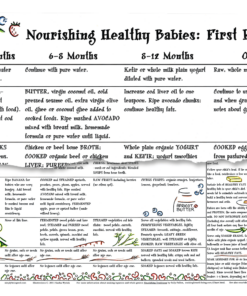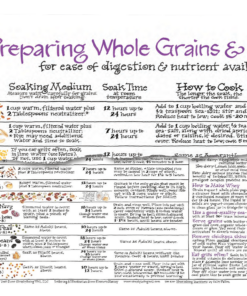Way back in 1939, Weston A. Price documented the link between diet and mental health in his groundbreaking book Nutrition and Physical Degeneration. His work still holds true to this day.
When Dr. Price studied indigenous cultures around the globe in the 1930s, he found that eggs from pastured hens, deep yellow butter from grass-fed cows, rich, fresh, raw milk, organ meats, and fatty fish all had something interesting in common. They were integral to the diets of people with sunny dispositions, easy pregnancies, healthy children, and long lives. These cultures had not yet been touched by “the denatured foods of modern commerce,” including processed foods made from rancid white flour and white sugar, as well as other foods devitalized by the heat of pasteurization.
Want rose-colored glasses like the people studied by Dr. Price? Eat butter! Think I’m kidding? Deep yellow butter from pastured cows is rich in vitamin F, also known as essential fatty acids, as well as vitamins A, D, and E. These nutrients are absolutely vital for mental health. In fact, butter from grass-fed cows contains the perfect fatty acid profile for brain health. And it’s far better than the expensive fish oils (which usually go rancid in the bottle anyway) that you are spending so much money on. So if you are feeling blue or depressed or anxious, eat butter, and gobs of it. It’s good for your brain and so much more. In fact, these nutrient dense foods offer everything we need to conceive, develop, grow, and thrive. We even need them for our mental health.
Nutrition and mental health. It is such a big issue that it may be helpful to sort mental health issues into groups (such as what caused them and when they occurred). We can trace some mental health issues to genetics. Dr. Price would call this the health of the “germ cell” of the mother or father, which means the health or viability of the egg or the sperm. The health of the germ cells is dependent on the nutrition of the parents before conception and pregnancy. (These days, we must also factor in the detrimental effect of environmental toxins and other hazards of modern life.)
We can trace other brain function issues to the mother getting inadequate nutrition when the fetus is in utero (the “formative period”). Still others are the result of nutritional insufficiency during the early years of the child, from birth to age seven. Whether or not the symptoms of nutritional insufficiency can be undone, or corrected, depends on the stage at which it occurs—preconception, in utero, or after a child is born.
Connect the Dots: Processed Foods and Mental Illness
We can connect the dots between the declining consumption of nutrient dense foods and rising rates of depression, anxiety, and mental health disorders. As Americans began consuming more and more processed foods over the past hundred years or so, we became more and more sick.
In the 1930s, Weston Price and many of his colleagues noted increased occupancy rates in mental institutions, “schools for delinquents,” and hospitals. What was causal? More birth defects. More delinquents. Less robust mental health. At the same time, white flour and white sugar became the norm. Cheaper man-made and lab-made fats such as Crisco were heralded as “better” than butter, and Americans no longer had easy access to nutrient dense foods. The average American diet contains even fewer nutrient dense foods now.
Not only that, but it is questionable if we are eating food at all these days, what with chemical fertilizers, GMOs, food fractions, and microwaves (see my article “What Is Real Food? Why Does It Matter?” in Regenerate Magazine to learn more on this).
Dr. Price treated mental and physical degeneration with food. Nutrient dense food. Today, we treat mental illness with pills—a host of antidepressant, antipsychotic, and anti-anxiety meds. Prescriptions starting from as early as a few months old that set you up for more and more imbalance over time.
Today, a surprisingly large percentage of children born to American mothers have mental, behavioral, or developmental challenges. The rates are nearly epidemic. According to the CDC, these challenges affect one out of seven children between the ages of two and eight (as of 2012). Up to 15 percent do not meet their developmental milestones on time. They are slow to walk, slow to talk. ADD, ADHD, autism spectrum, OCD, SPD…the alphabet soup of diagnoses goes on. The rate of Down syndrome increased 30 percent from 1979 to 2003. And millions of American children have diagnosed depression and anxiety. Our kids have problems focusing, concentrating, thinking. They cannot sit still. They are wired and tired and depressed. And MEDICATED. Our children.
What We Can Do
Once a child is born with a mental health issue caused by genes, we cannot go back and re- do the genes. But we can be sure to give that child the nutrients he or she needs to thrive given their baseline at birth. Fathers and mothers can eat the foods they need to create healthy germ cells before pregnancy. Moms can eat these foods while pregnant—or, ideally, several years before pregnancy—so their future children will have the nutrients they need to develop true to their divine blueprint. Parents can feed their growing children nutrient dense foods so their brains have what they need to focus, concentrate, center, and think. Foods that allow children to grow and thrive to their fullest potential, to grow into healthy adults who have a better chance to bear healthy offspring.
do the genes. But we can be sure to give that child the nutrients he or she needs to thrive given their baseline at birth. Fathers and mothers can eat the foods they need to create healthy germ cells before pregnancy. Moms can eat these foods while pregnant—or, ideally, several years before pregnancy—so their future children will have the nutrients they need to develop true to their divine blueprint. Parents can feed their growing children nutrient dense foods so their brains have what they need to focus, concentrate, center, and think. Foods that allow children to grow and thrive to their fullest potential, to grow into healthy adults who have a better chance to bear healthy offspring.
It is about the food, folks. Food is the foundation. Nutrient dense foods from pastured animals—eggs, butter, raw milk, organ meats, and fish eggs—are critical throughout your life and your child’s life, even before your baby is just a twinkle in your eye.
For more detailed information about Weston A. Price’s studies around the globe, read Nutrition and Physical Degeneration. Also visit WestonAPrice.org to find a WAPF chapter near you. And to learn how to cook nutrient dense foods, see my book, With Love from Grandmother’s Kitchen: Traditional Cooking Techniques for Well-Being, or visit my website at SimplyBeingWell.com
Images from iStock/phototechno (main image),/draghicich (dairy plate).





Thanks – great article!